JWF Fund 2017
Japan Water Forum (JWF) Fund managed through fees from corporate and individual members and donations is the initiative that supports grass-roots organizations to address water-related issues in developing countries. 2017 is the 13th year since its establishment in 2005.
In the JWF fund 2017, we have received 211 applications from 31 countries.
As the result of selection, we have decided to provide funds for 7 projects from 6 countries.
- Application Period: 1 June to 31 July, 2017
- Number of the Applicants: 211 projects from 31 countries
- Selected projects: 7 projects from 6 countries; Ethiopia (1), Cameroon (1), Kenya (2), India (1), Bangladesh (1), Philippines (1)
Recipients of JWF Fund 2017
1.Improving access to water and enhance communities awareness on sanitation in Gursum district, Quramatana kebele (Ethiopia)
Outline of the project
・Organization: Nurture Education and Development (NED) (#133)
・Project title: Improving access to water and enhance communities awareness on sanitation in Gursum district, Quramatana kebele
・Country/Area: Ethiopia/Somali region
・Project period: October 2017 to February 2018
・Number of beneficiaries:1,040 people (420 Women, 350 men and 270 children)
・Cost: 2,199 USD (JWF Fund 1,000 USD, contribution beneficiaries, NED and district water office 1,199 USD)
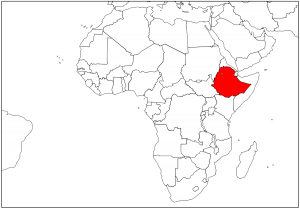 |
| Ethiopia |
Background
In the targeted area, there is high scarcity of water supply system and sanitation facility, therefore, water and sanitation is in a severe condition. Women and girls have to spend more than 2 hours to fetch water from a distant small river with riding donkey. However, people wash their clothes and bodies and defecate open around the water source. In addition to that, animals also use that water source. As a result, people are exposed to water-borne disease such as cholera, diarrhea, and typhoid.
Contents of the project
Holding a meeting to explain the project, construction of 1 hand pump, workshops and trainings on Health and Hygiene awareness, establishment of water management committee, a training on operation and maintenance of the hand pump, water quality test
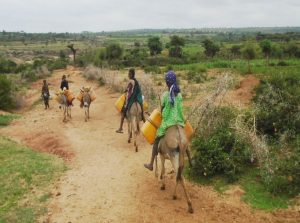 |
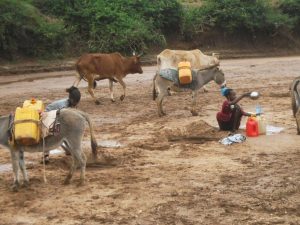 |
| People heading the small river riding donkey | Animals using the water source |
2.Water For Life Project Nkum Ekie (Cameroon)
Outline of the project
・Organization:Community Awareness and Development Association Cameroon (CADAC) (#172)
・Project title: Water For Life Project Nkum Ekie
・Country/Area: Cameroon/Centre Region
・Project period: October 2017 to February 2018
・Number of beneficiaries: 179 people (38 Women, 20 men and 121 children)
・Cost: 1,723 USD (JWF Fund 1,000 USD, contribution from beneficiaries, CADAC, community council and so on 723 USD)
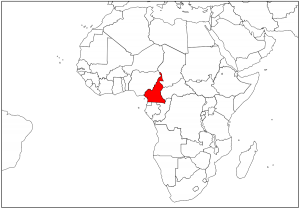 |
| Cameroon |
Background
According to the result of survey which National Institute of Statistics on Households carried out between 2014 and 2016, the water-related diseases still remain rampant in the targeted area, though the water-related diseases in other areas in the country have improved. People living in Nkum Ekie village take water from a distant river from their village, and they use that water to wash dirty cloths, dishes, other materials and body. A lot of mosquitoes breed around the water source, which makes children and women at risk of malaria. Even the community health center does not have clean water supply facility.
Contents of the project
Construction of 1 deep well, implementing workshop on water-related disease and operation and maintenance of the well, establishment of maintenance committee, water quality test
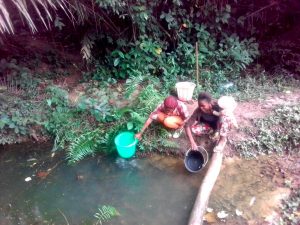 |
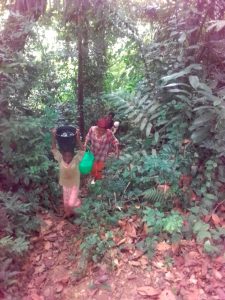 |
| Water source which residents use | Steep path to the water source |
3.Equipping Eshiru primary school with 1 block of 3 re-usable pit-latrines and 4 hand-washing facilities, and 1,200 pupils in the school with skills in hand-washing and importance of pit-latrines (Kenya)
Outline of the project
・Organization: Renewed Hope Group (RHG) (#054)
・Project title: Equipping Eshiru primary school with 1 block of 3 re-usable pit-latrines and 4 hand-washing facilities, and 1,200 pupils in the school with skills in hand-washing and importance of pit-latrines
・Country/Area: Kenya/Kakamega County
・Project period: October 2017 to February 2018
・Number of beneficiaries: 1,200 people (800 girls and 400 boys)
・Cost: 1,379 USD (JWF Fund 1,000 USD, contribution from beneficiaries and RHG 379 USD)
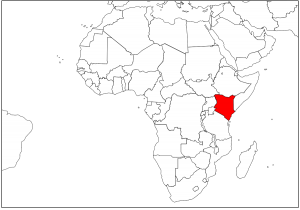 |
| Kenya |
Background
Eshiru public primary school, which has 1,200 poor pupils, has only 2 pit latrines to be fully filled up after half a year. Pupils have to stand in a queue to use existing pit-latrines during break or lunch time. As a result, most of them delay returning to classes and often defecate open in bushes around the school to catch up with time. Pupils do not have enough knowledge about importance of using pit-latrines and hand-washing. In addition to that, the school lacks hand washing facilities. At-least 4 out of every 10 children in the school are infected with water-borne diseases every year, therefore, local public health authority regularly closes down the school temporarily.
Contents of the project
Construction of 3 VIP latrine and 4 hand washing facilities with water tanks, trainings on usage of pit latrine and awareness raising about importance of pit latrine, establishment of operation and maintenance committee.
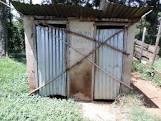 |
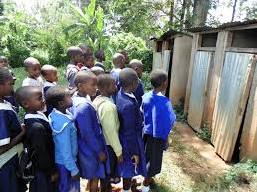 |
|
Waste-filled latrine is closed |
Students waiting for the latrine |
4.Promoting access to safe water in Luyekhe community through construction of 1open spring well with insalubrious water (Kenya)
Outline of the project
・Organization:Ufanisi Women Group (#031)
・Project title: Promoting access to safe water in Luyekhe community through construction of 1open spring well with insalubrious water
・Country/Area: Kenya/Bungoma County
・Project period: October 2017 to February 2018
・Number of beneficiaries: 750 people (150 women, 150 men and 450 children)
・Cost: 1,349 USD (JWF Fund 1,000 USD, contribution from beneficiaries and Ufanisi Women Group 349 USD)
 |
| Kenya |
Background
About 150 households live in Luyekhe community and they use water from a heavily contaminated open spring. This water source is not protected well and people defecate open, therefore human excrete and other wastes flow into the spring. People consume the water without treatment. This leads to water-borne disease such as diarrhea and deaths. Almost half of the people in the community visit local clinics. Public health authority occasionally closes down community’s school due to outbreak of the diseases.
Contents of the project
Protection of the open spring, implementing 3 workshops on water and sanitation and operation and maintenance, establishment of operation and maintenance committee, and water quality test
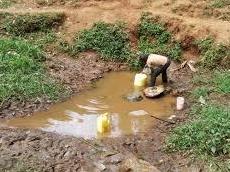 |
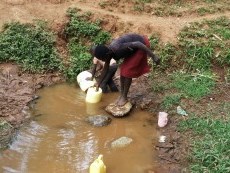 |
| Residents collecting water from contaminated water source | |
5.Repair of wells ,bore wells, awareness on hygiene and training program in repair of bore wells to unemployed youth (India)
Outline of the project
・Organization: Rural Action In Social Emancipation (RAISE) (#047)
・Project title: Repair of wells ,bore wells, awareness on hygiene and training program in repair of bore wells to unemployed youth
・Country/Area: India/Andhra Pradesh State
・Project period: October 2017 to February 2018
・Number of beneficiaries: 230 people (80 women, 100 men and 50 children)
・Cost: 1,030USD (JWF Fund 1,000 USD and contribution from RAISE 30 USD)
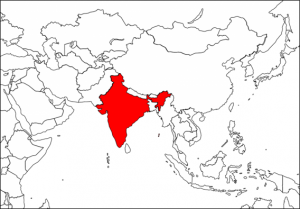 |
| India |
Background
Most of the people in targeted village belongs to lower class and they are illiterate. The village has shallow wells and bore wells which were constructed a few decades ago. The shallow wells have become dirty due to ignorance of proper usage, which leads to various water-borne diseases such as dysentery, diarrhea, amoebiosis, hepatitis. In addition to that, water in the wells mingled with mud due to aging of the boreholes.
Contents of the project
Repairing and cleaning of existing wells, training on water and sanitation, establishment of operation and maintenance committee, a training on operation and maintenance of the wells, water quality test
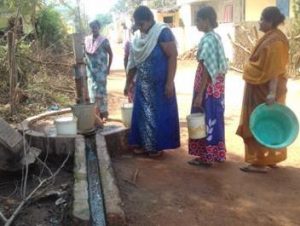 |
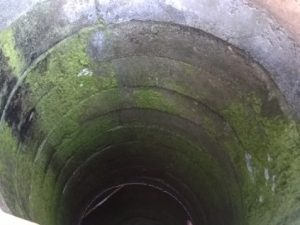 |
| Water in borewell mingled with mud | Inside of shallow well |
6.Ensure child education through construct a hygienic latrine & water supply (Bangladesh)
Outline of the project
・Organization: BASCO Foundation (#157)
・Project title: Ensure child education through construct a hygienic latrine & water supply
・Country/Area: Bangladesh/Magura district
・Project period: October 2017 to February 2018
・Number of beneficiaries: 80 people (24 girls, 16 boys and 40 women)
・Cost:1,365 USD (JWF Fund 1,000USD, contribution from stakeholder and BASCO Foundation 365 USD)
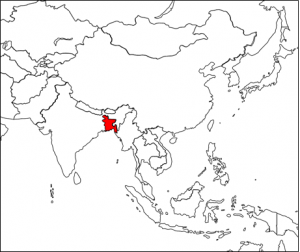 |
| Bangladesh |
Background
In Roygram village, there is no public nor private primary school. There is only one primary school with 40 children which local communities are operating. As this school cannot get any support from government, it does not have any facility for water and sanitation. Therefore, the students defecate at open field and drink dirty water. Especially girls are unwilling to defecate open, therefore they do not want to go to school. It makes many girls drop out of school and their parents reluctant that their daughters go to school.
Contents of the project
Construction of 1 bore well with filter and 6 pit latrines, workshops on usage of facilities and basic health, establishment of operation and maintenance framework, water quality test
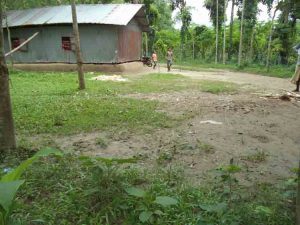 |
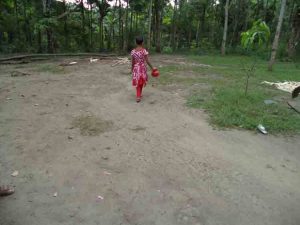 |
| No water and sanitation facilities in the school | Pupils going to bushes to defecation |
7.Rainwater Harvesting Project(Philippines)
Outline of the project
・Organization: Asset-Based Community Development with Equity Foundation (ABCDE Foundation) (#108)
・Project title: Rainwater Harvesting Project
・Country/Area: Philippines/Zamboanga del Norte
・Project period: October 2017 to February 2018
・Number of beneficiaries: 240 people (70 women, 55 men and 115 children)
・Cost: 1,121.5 USD (JWF Fund 1,000 USD、contribution from ABCDE Foundation 121.5 USD)
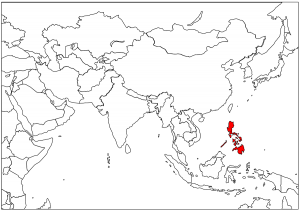 |
| Philippines |
Background
The project site is mountainous and water source such as springs and creeks are far from the site. People have to down hills to fetch water and it takes around 1.5 hours. It is difficult for women to fetch water out of the distant water source and wash clothes everyday. Severe lack of water has affected health, hygiene and the economic condition of local people.
Contents of the project
Construction of 2 rainwater harvesting tanks, establishment of operation and maintenance committee, water quality test
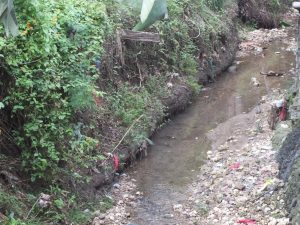 |
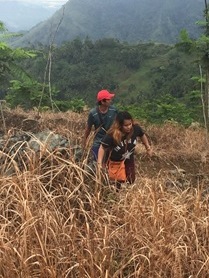 |
| Small river as a water source | ABCDE Foundation conducted pre-survey |
(Reported by Akie Gunji, Manager)
